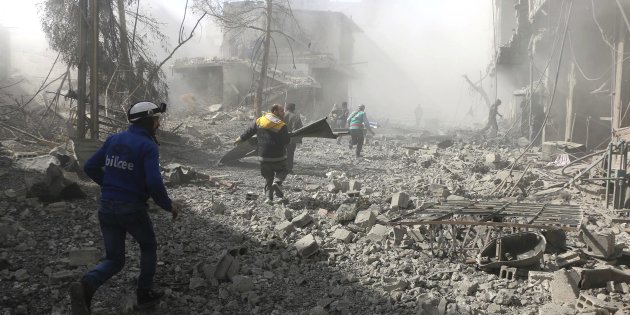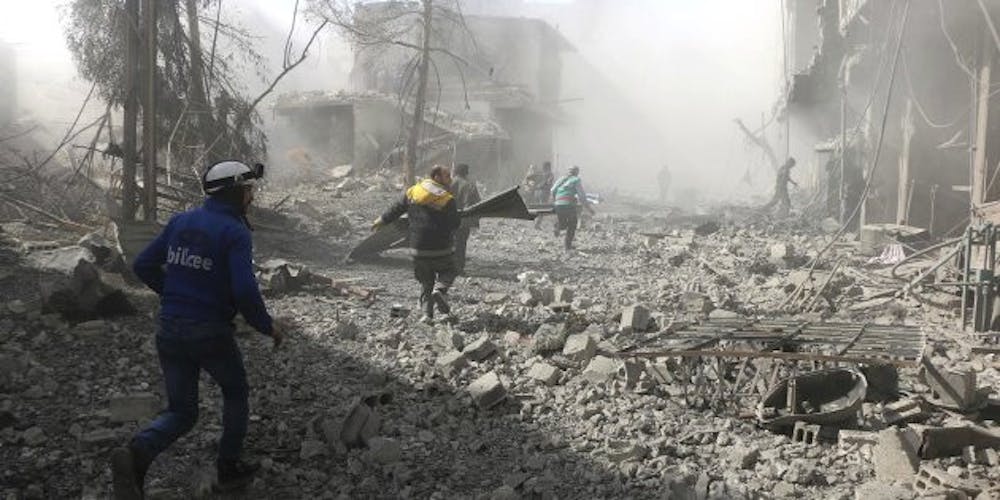By James Wright
Correspondent
Hundreds of Syrian citizens were killed after a series of military bombardments, beginning on Feb. 18 and occurring sporadically over the following weeks, devastated the rebel-held capital city Damascus, according to The New York Times.

The Syrian Observatory for Human Rights totaled the death count at over 600, including at least 121 children. The bombardment was authorized by the Syrian government, led by President Bashar al-Assad, according to The New York Times.
The U.N. responded with strong opposition to the bombardment. Panos Moumtzis, the U.N. regional humanitarian coordinator for the Syrian crisis, released a statement that read “Such targeting of innocent civilians and infrastructure must stop now,” according to The New York Times.
The U.N. also unanimously passed a resolution on Feb. 24 calling for a 30-day ceasefire, according to CNN, yet it seems to have done little to prevent government aggressions. The ceasefire was violated only hours after it was passed, as the Syrian government continued its siege of the territory, according to Al-Jazeera,
"The shelling has not stopped. The (Syrian) regime has not abided by the timings of the ceasefire. The violations of the truce are constant — 24 hours a day," said Abdelmalik Aboud, a Syrian citizen who lives in the Damascus suburb of Douma, according to Al-Jazeera.
Since 2011, Syria has been engulfed in a civil war which has resulted in over 465,000 civilian casualties, according to Al-Jazeera.
After the toppling of dictators including Muammar Gaddafi in Libya and Hosni Mubarak in Egypt, pro-democracy activists in Syria formed the Free Syrian Army in an attempt to overtake the Ba’ath government led by Secretary General Bashar al-Assad.
One of the last rebel-held areas near Damascus is Ghouta, a suburb outside Syria’s capital city and a center for pro-government activists, according to Al-Jazeera.
Many civilians are speaking out about their government’s persecution of the many people that it considers to be terrorists, such as the citizens of Damascus.
“We might die any moment,” said Tareq al-Dimashqi, a resident of Eastern Ghouta with a 5-month-old baby, according to The New York Times. “You don’t know where the rockets might come from and end our lives.”
Since the beginning of the war, the Syrian government has been looking to reclaim its lost territory by bombarding cities overtaken by rebel groups, displacing over 12 million people in the process, according to Al-Jazeera.
Russia’s ambassador to the U.N., Vassily Nebenzia, spoke about the “extensive and exhaustive” process of forming the resolution, according to CNN.
“Because by decrees of the Security Council, you cannot install a ceasefire,” Nebenzia said. “A ceasefire is reached by laborious and painstaking process on the ground.”
The Syrian American Medical Society reported that though pro-government Syrian officials have denied using chemical weapons, 16 people, including six children, have been treated for exposure to chlorine gas, according to CNN.
Despite the ceasefire, many are beginning to lose hope.
“Nothing has changed,” said Dr. Hamza Hassan, a doctor from Ghouta’s Arbeen Hospital, according to CNN. “The airstrikes are continuing.”







